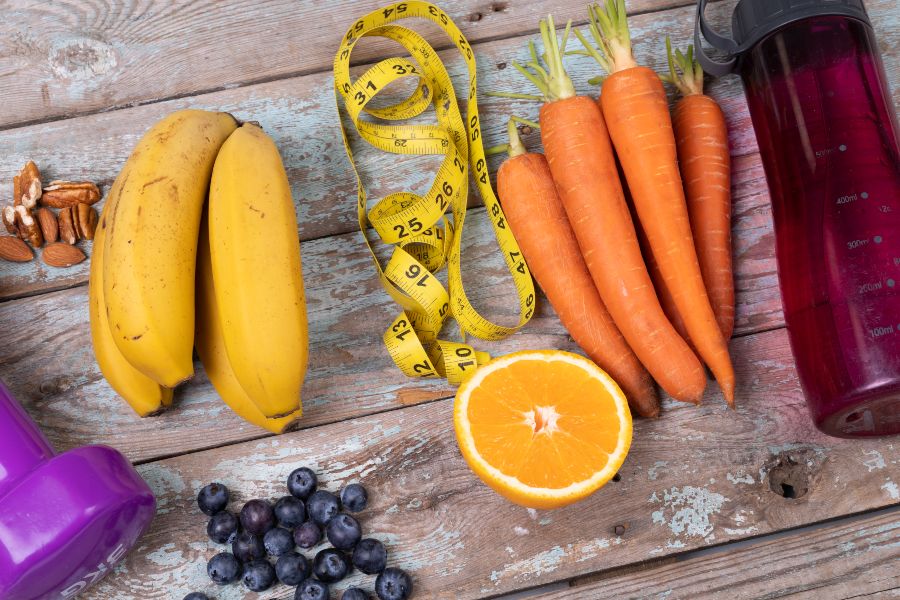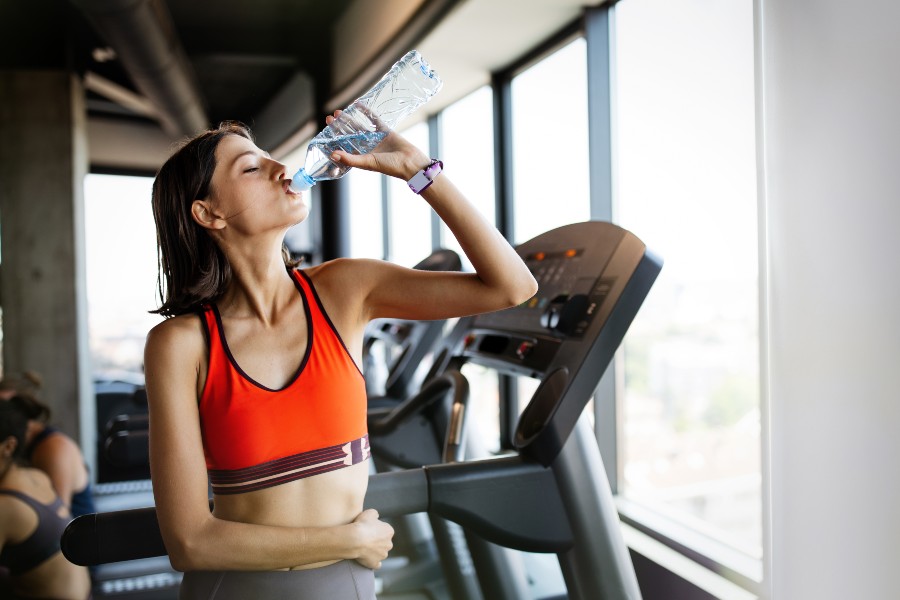
FOOD FOR ATHLETES: EXAMPLE OF A WEEKLY DIET
Nutrition for athletes is a fundamental factor for the optimal development of any physical activity. Athletes and sports and fitness enthusiasts have special nutritional needs in order to perform at their best in sports.
Performance is the relationship between the goals that an athlete achieves, and the resources that he uses to achieve them. This performance is influenced by several agents, including physical capacity and factors linked to health and nutrition.
Although sports performance does not depend exclusively on diet, it can influence better physical fitness and good health. In this post we tell you how diet can affect an athlete and what are the foods that are recommended to consume.

WHAT FOOD DOES A SPORTSMAN NEED?
A balanced diet is essential for good health and, in addition, in athletes it is also essential to obtain good sports performance, both in professionals and in people who are starting to practice a sport.
Carbohydrates
Carbohydrates are a great source of energy for the body. The ability to withstand the intensity of a workout depends on the stored glucose that is obtained from carbohydrates. Some foods rich in carbohydrates are: rice, pasta, potatoes, legumes and fruit.
Fats
Fats also provide energy, even more concentrated than carbohydrates. However, you have to be especially careful with saturated fats. These stick to the walls of the arteries and their excess can lead to health problems. Also, fats are digested very slowly, so the energy you get from them is not as efficient as carbohydrates. Therefore, it is not recommended that fat consumption exceed 20% of the total diet.
Protein
The function of proteins is to build tissues such as muscle. In addition, the muscles can also use protein as a source of energy. Fish, eggs, meat or milk are foods that provide a large amount of protein. However, it should not be abused, since the body cannot store too much protein and these go to the liver instead of the muscle, turning into fat. Therefore, it is recommended that it be 15% of the diet to avoid long-term liver damage.
Vitamins and minerals
Vitamins and minerals do not offer much energy for sports, but they are essential for the body's functions. Although these nutrients will not improve your workout performance, they are important for good health.
Water
Water is essential for good sports performance. Sweat causes water to be lost through the skin and this must be recovered. Therefore, you should drink water before, during and after exercise to avoid dehydration. You don't have to wait until you're thirsty to drink.
FOOD ACCORDING TO THE LEVEL OF THE ATHLETE
Each physical activity requires a different diet and a specific supply of nutrients. It is also different if you are an elite or professional athlete, or an amateur. For example: it is not the same to go for a run a couple of times a week, to a professional athlete who trains every day at a high level. Everyone has to take care of their diet , but each one with special conditions.
Nutrition in elite or professional athletes
Most are usually advised by specialized dietitians, who study their specific needs, and create a specific diet for each of them. A diet, for any professional athlete, should not be just protein. The perfect ratio would be: 50-60% carbohydrates / 25-30% fat / 10-15% protein.
Nutrition in sports enthusiasts
Many people do sports on a regular basis, or as a hobby, so they also need food guidelines, but more flexible than those of a professional athlete.
WEEKLY DIET FOR ATHLETES
Next, we leave you an example of a weekly menu for athletes. You can follow this same, change or combine foods or meals. Always consult with your doctor before following any diet.
| MONDAY | TUESDAY | WEDNESDAY | THURSDAY | FRIDAY | WEEKEND | |
|---|---|---|---|---|---|---|
| BREAKFAST |
fruit bowl Wholemeal toast with fresh cheese and tomato |
Greek yogurt bowl with oatmeal, banana and dark chocolate |
Coffee Integral toast with oil and tomato |
Scrambled eggs with serrano ham Natural orange juice |
Bowl of fresh cheese smoothie with strawberries, cereals and nuts | Free |
| FOOD |
Brown rice with vegetables and egg 1 piece fruit |
Neapolitan turkey breast Potato omelette |
Green salad Spaghetti with mushrooms and prawns |
Grilled loin lentil salad |
Steamed vegetables Baked salmon fillet |
Free |
| DINNER |
Tomato and tuna salad with spices and seeds | Scrambled eggs with mushrooms and prawns |
Green salad Octopus at planch |
Vegetable cream Tuna omelette |
Green salad Baked hake |
Free |
DIET TIPS FOR ATHLETES
If you practice sport or moderate exercise you will have many benefits for your health and physical and mental well-being. Some of these benefits can be: circulation activation; oxygenation of the lungs; increased energy or development of cardiovascular capacity. To obtain all these benefits of sport or exercise, the diet must be very balanced so that you have the necessary energy and nutrients and that your body works properly.
Nutrition experts always advise eating between 4 and 5 meals a day, to divide food intake. In this way, it is possible not to arrive hungry at the main meals, such as lunch and dinner, and to avoid eating abundantly.
It is also advisable to put aside fried foods and processed foods. On the contrary, it is recommended to consume grilled, cooked or steamed foods. Eliminate alcohol or only leave it for special occasions and avoid drinks such as soft drinks, since they include too many sugars that will not benefit you if you consume them regularly.
Here are 5 tips for optimal nutrition for athletes:
1. Iron and protein intake
Iron is a fundamental nutrient for proper physical performance. This is found in seeds, vegetables, legumes and fish among others. On the other hand, there are the proteins that, as we have already said, we must pay attention to. Try to have them present in your diet, but never become an excess. These can be found in meat, fish, eggs, and vegetable proteins such as soy.
2. Includes complex carbohydrates
Carbohydrates are a great option to keep your blood glucose level high enough. In this way you can carry out your sports routine and not get tired a few minutes after starting. You can increase your resistance with the help of legumes (lentils or beans), cooked whole grains.
3. Monitor the nutritional value of food
Opt for steam cooking, leaving aside the frying. Always wash food before eating it and, if possible, cook food just before consuming it to make the most of all the nutrients.
4. Hydration is essential
Hydration is an essential part but, above all, when it comes to someone who practices sports quite frequently. In addition to drinking water, there are different alternatives to hydrate your body, such as foods rich in water: watermelon, tomatoes or cucumber. All of them contain more than 90% water in their composition. You can also recover your hydration with the consumption of natural juices, teas or infusions.
5. Forbidden foods
To improve your physical performance it is important to avoid certain foods such as processed foods or industrial pastries. In general, any food that exceeds sugar and salt. Also try to cut out alcoholic beverages and any excess salt in your meals.

FOOD SUPPLEMENTS, YES OR NO?
Both professional and amateur athletes should supplement the caloric expenditure produced by physical activity with a balanced diet that provides adequate amounts of fats, proteins, carbohydrates and micronutrients. They will depend, of course, on the intensity that the physical activity requires. Despite this, on some occasions athletes do not finish covering energy demand only through diet, which is why some opt for the help of nutritional supplements.
- What are nutritional supplements? These are products that are intended to supplement the normal diet with concentrated sources of nutrients. These products are usually sold in dosed form such as pills, capsules, sachets of powder... They must be taken in the recommended doses that appear on each label. The food supplement can be made up of a single nutrient or a combination of several.
- What are they for? Keep in mind that they do not replace the foods of a healthy diet, but rather complement them. These supplements help regular athletes consume the right amount of calories. Some of these supplements are taken before, during or after physical exercise (it will depend on each of them). Nutritional supplements provide nutrients for better physical performance.
- What are the most common food supplements? There are several types such as, for example: minerals (calcium, iron, zinc, magnesium, sodium, chlorine and potassium). Vitamins: energy metabolism (vitamin B), maintenance of bones and cartilage (Vitamin C, D), iron metabolism (vitamin A, C), reduce tiredness and fatigue (Vitamin B, C), glycogen (Vitamin B), good heart function (Vitamin B), muscle function (Vitamin D) and strengthen the immune system (Vitamin C).
The choice of this type of supplements will depend on each one, their special needs and their tastes. In any house, it must always be kept in mind that the consumption of nutritional supplements are not substitutes for normal food, but must be used as a supplement to food.
Nutrition for athletes is a fundamental part. This directly affects your performance and fitness. If you haven't started playing sports on a regular basis yet, but you want to start your new lifestyle now, I invite you to stop by the ATAA Sports online store. We have the best fitness machines on the market, do not miss the opportunity!

 Español
Español Deutsch
Deutsch Italiano
Italiano Português PT
Português PT Français
Français English GB
English GB